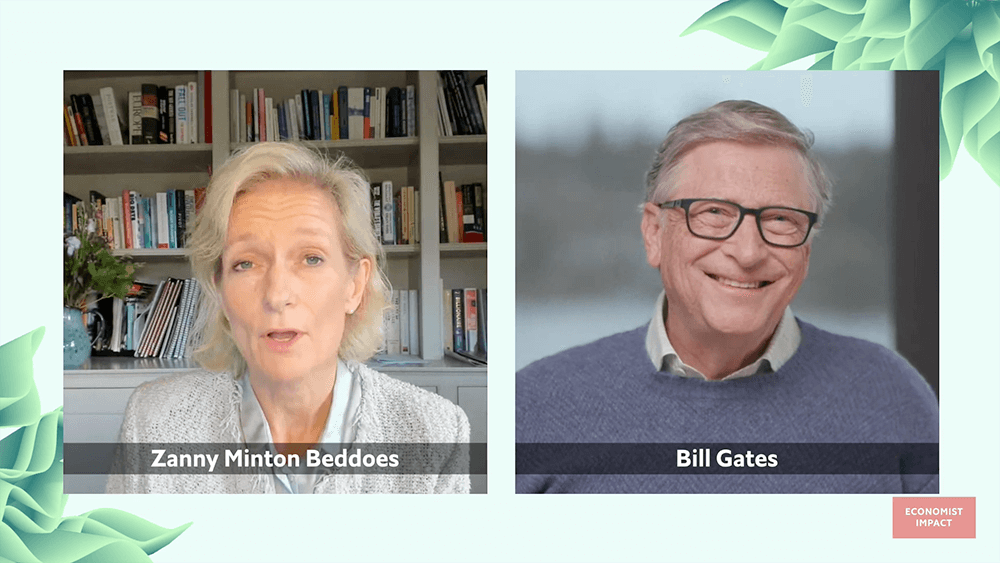
The Economist’s editor-in-chief Zanny Minton Beddoes interviews Microsoft founder Bill Gates about the challenging the world faces in reaching net zero carbon emissions by 2050. (Screengrab)
Editor’s note: Renowned anthropologist Dr. Jane Goodall has said of the climate crisis, “What you do makes a difference, and you have to decide what kind of difference you want to make.” With that in mind, we are dedicating the upcoming edition of Convene fully — our first single-topic issue — to the climate crisis, and what the business events industry is doing to address this global challenge. This article will appear in the November/December print issue.
The Economist’s virtual conference Sustainability Week: Countdown to COP26 brought together leaders from the government and private sectors to address the challenges businesses face in the transition to a sustainable, net-zero economy. A total of 8,729 attendees joined during the Oct. 4-7 event that featured more than 150 speakers in 65 different sessions.
For the opening keynote interview, The Economist’s editor-in-chief Zanny Minton Beddoes spoke with Bill Gates, philanthropist and founder of Microsoft, about the challenges he sees in the world reaching net zero. Net zero refers to the balance between the amount of greenhouse gas produced and the amount removed from the atmosphere in return.
Gates, who founded Breakthrough Energy with a coalition of private investors in 2015 to create, transform, or support the technologies we need to achieve net-zero emissions by 2050, considers the issue a priority. While the nearly 40-minute interview ranged from such topics as carbon taxes, direct air capture of CO2, and green hydrogen, his most emphatic message was that “we must have innovation” if we hope to achieve the Paris Climate Accord goal of reaching net-zero emissions by 2050.
“We have to succeed in every area of emissions,” Gates said of innovations that show promise in reducing greenhouse gases. “It’s worth investing in all these good ideas.”
Gates said he believes that businesses and governments, with the targeted support of the private sector and philanthropy, must lead the way — and he offered ideas for how that could happen — all leading back to innovation.
For businesses: increase research and development, hire smart people, increase access to high risk capital, get big companies and not just startups involved, fund projects to get to operation at scale.
For governments: increased support for research and development, funding for big projects, carbon tax and tax credits, streamlining regulatory processes to speed up implementation of initiatives.
At the end of the interview, Milton Beddoes asked Gates what the probability of getting to net-zero emissions by 2050 is.
“It’s going to take immense political will, in many regions of the world, in all 30 of the next years,” he said. “With the right political support, and a little bit of luck on some of the innovation paths, I believe we can get to [net] zero… There is no comparable thing that humanity has ever done where in a pretty short period of time we’ve changed the whole physical economy.”
Milton Beddoes, eager to hear a more bottom-line answer, asked Gates if he sees the probability as greater or less than 50 percent. His answer, he said, is based on his being an optimist, and his belief in innovation.
“Yes, it’s greater than 50 percent,” he said.
Curt Wagner is digital editor at Convene.
